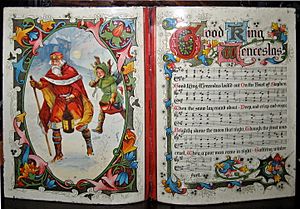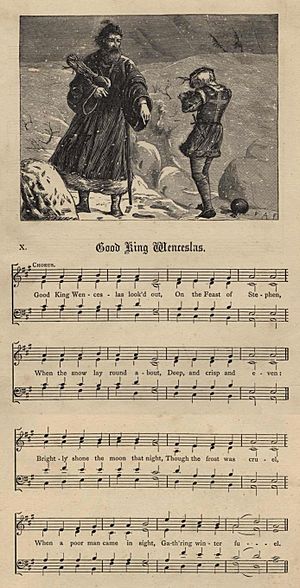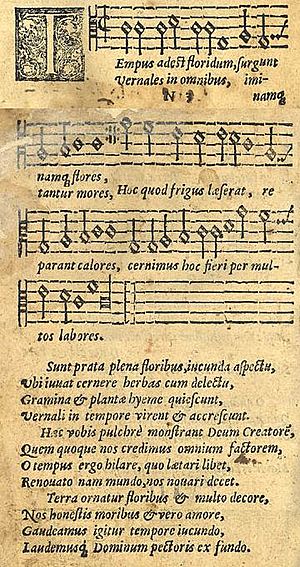Good King Wenceslas facts for kids
"Good King Wenceslas" is a popular Christmas carol that tells a heartwarming story. It's about a kind king from Bohemia who bravely goes out in harsh winter weather to give help and gifts (called alms) to a poor peasant. This happens on the Feast of Stephen (December 26th), which is the day after Christmas.
During his journey, the king's helper, his page, starts to struggle against the cold. But the king encourages him to keep going by telling him to step exactly in his footprints in the deep snow. The page follows, and finds it easier to walk. This famous story is based on the real life of Saint Wenceslaus I, Duke of Bohemia, who lived a long time ago, from 907 to 935.
The words for "Good King Wenceslas" were written in 1853 by an English hymnwriter named John Mason Neale. He worked with his music editor, Thomas Helmore. The song first appeared in a book called Carols for Christmas-Tide that same year. Neale's words were set to a very old tune from the 13th century. This tune was originally for a spring carol called "Tempus adest floridum" ("Eastertime has come"). It was first published in a Finnish song collection called Piae Cantiones in 1582.
Contents
The Story Behind the Song

Wenceslas was seen as a very important and holy person, a martyr and a saint, right after he died in the 10th century. People in Bohemia and England began to honor him. Within a few decades of his death, four different life stories about him were being shared. These stories, called hagiographies, greatly influenced how people in the High Middle Ages thought about a "righteous king." This was a monarch whose power came mostly from being very religious and good, as well as being a strong leader.
A preacher in the 12th century wrote about Wenceslas:
But his deeds I think you know better than I could tell you; for, as is read in his Passion, no one doubts that, rising every night from his noble bed, with bare feet and only one chamberlain, he went around to God's churches and gave alms generously to widows, orphans, those in prison and afflicted by every difficulty, so much so that he was considered, not a prince, but the father of all the wretched.
Even though Wenceslas was only a duke during his lifetime, the Holy Roman Emperor Otto I (who ruled from 962–973) later gave him the title of "king" after his death. This is why, in the legend and the song, he is called a "king." It's important not to confuse him with King Wenceslaus I of Bohemia, who lived much later.
How the Song Was Written
The Old Tune: "Tempus adest floridum"
The melody of "Good King Wenceslas" comes from a 13th-century spring carol called "Tempus adest floridum" (which means "Eastertime has come"). This tune was first published in a Finnish songbook called Piae Cantiones in 1582. Piae Cantiones was a collection of 74 songs put together by Jacobus Finno, a Protestant headmaster. The book was meant for use in both churches and schools. It gives us a special look at songs from the late medieval period in Europe.
John Mason Neale's Lyrics
In 1853, the English hymnwriter John Mason Neale wrote the words for "Wenceslas." He worked with his music editor, Thomas Helmore. The carol first appeared in a book called Carols for Christmas-Tide, published by Novello & Co that same year.
The words Neale wrote have nothing to do with the original "Tempus Adest Floridum" song. Around 1853, a British diplomat named G. J. R. Gordon gave Neale a rare copy of the 1582 Piae Cantiones book. This book was unknown in England at the time. Neale was part of a group called the Tractarian Oxford Movement, which wanted to bring back older Catholic traditions, saints days, and music into the Anglican church. This gift gave him a chance to use old medieval Catholic tunes for new Anglican hymns.
In 1849, Neale had published a book for children called Deeds of Faith: Stories for Children from Church History. One chapter told the legend of Saint Wenceslas and how his footsteps melted the snow for his page. This story inspired him to write the carol.
For his 1853 Christmas carol book, he turned his earlier story into a poem. He and Thomas Helmore then set these words to the old "Tempus adest floridum" tune from Piae Cantiones. They added a reference to Saint Stephen's Day (December 26th), making it perfect for that day.
Some experts have criticized Neale's choice to use a spring tune for a Christmas carol. They felt the light, dance-like tune didn't fit the serious, moral story. However, many others, including Brian Scott and Jeremy Summerly, believe the carol is "magical" and reminds us that the giving spirit of Christmas should last all year.
Other Versions of the Song
Many artists have recorded or performed "Good King Wenceslas." Here are a few examples:
- William Lloyd Webber included it in his Songs without Words.
- The Beatles' featured several versions on their 1963 Christmas Record.
- In 1984, Mannheim Steamroller recorded an electronic version for their first Christmas album.
- The Trans-Siberian Orchestra re-worked the tune for their track "Christmas Jazz" in 2004.
- English folk duo Blackmore's Night covered it on their 2006 album Winter Carols.
- Canadian Celtic singer Loreena McKennitt included it on her 1995 EP A Winter Garden: Five Songs for the Season.
- In 2013, The Piano Guys made a piano-cello version for their album A Family Christmas.
- Mel Tormé covered the song on his 1992 Christmas Songs album.
- The Count Basie Orchestra recorded a big band version called 'Good Swing Venceslas' in 2015.
- Tenth Avenue North opened their 2017 Christmas album, Decade The Halls, with a 1920s-style version.
- Rob Halford, the singer from the metal band Judas Priest, covered it on his 2019 Christmas album, Celestial.
- The folk trio The Roches included it on their 1990 album We Three Kings (The Roches album).
- Relient K included it on their Christmas Album Let it Snow...Let it Reindeer.
Good King Wenceslas in Popular Culture
The carol has appeared in many movies, TV shows, and books:
- In the film Love Actually, Prime Minister David (Hugh Grant) sings the carol.
- Two Doctor Who episodes have mentioned the song. In one, the Doctor tells his companions to "Follow me and tread in my footsteps," and Sarah Jane replies, "Good King Wenceslas." In another, an alien tour guide mistakenly thinks Good King Wenceslas is the current monarch of the UK.
- In the TV special A Muppet Family Christmas, Gonzo sings this song.
- In the 1987 film Dragnet, Detective Pep Streebeck sings it during a car chase.
- In the video game The Walking Dead: Season Two, a character named Sarita sings the carol while decorating a Christmas tree.
- In the movie The Muppet Christmas Carol, Bean Bunny sings this song to Scrooge.
- In the Discworld book Hogfather, Death (acting as the Hogfather) changes the story of the king and beggar to make a point about true charity.
- Buford and Baljeet sing a changed version in A Phineas and Ferb Family Christmas.
- In The Simpsons episode "White Christmas Blues", guests start singing the song, but Marge dislikes it.
- In the 1983 movie A Christmas Story, the song is played by the Salvation Army Band.
- In The Polar Express, the song is played briefly and a hobo sings it.
- The 1987 BBC radio play Crisp and Even Brightly is a funny re-telling of the carol's story.
- On the Will & Grace episode "All About Christmas Eve", Karen sings the song.
- On The Big Bang Theory episode "The Santa Simulation", Sheldon sings the song while playing Dungeons & Dragons.
- In a blooper reel for Game of Thrones, Peter Dinklage and Nicolaj Coster-Waldau sing and dance to the carol.
- Comedian John Finnemore wrote a sketch based on the carol, where the poor man criticizes the king's actions.
- In Hogan's Heroes, POWs loudly sing the song to distract guards.
- The children's TV show Horrible Histories parodied the song with a more historically accurate version.
See also
 In Spanish: Good King Wenceslas para niños
In Spanish: Good King Wenceslas para niños
 | John T. Biggers |
 | Thomas Blackshear |
 | Mark Bradford |
 | Beverly Buchanan |



